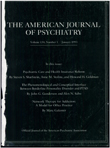Olfactory identification deficits in HIV infection
Abstract
OBJECTIVE: Impaired odor identification is described in a number of CNS disorders, and human immunodeficiency virus (HIV) infects the CNS in a large percentage of patients. To evaluate whether impaired olfaction may indicate CNS disease, the authors measured odor identification in patient groups defined along a continuum of progressive immunodeficiency and in a comparison group. METHOD: Most of the 42 HIV- infected patients in the study were outpatients in a clinic specializing in treatment of HIV-infected individuals. The comparison subjects were 37 healthy age- and sex-matched individuals who were recruited from hospital and medical school personnel. Ten of the patients were HIV-seropositive but had no symptoms, 24 had clinical evidence of immunocompromise, and eight had HIV dementia. All subjects were given the University of Pennsylvania Smell Identification Test, which presents common odorants and requires the subject to identify the odor from a four-item word list. The data were analyzed by using analysis of variance after arc-sine transformation and Scheffe post hoc analysis. RESULTS: All patients scored significantly lower on the Smell Identification Test than did the comparison subjects. The patients with HIV dementia had significantly lower scores than did the other two groups of patients. CONCLUSIONS: Clinically, impaired olfaction might serve as a marker of early CNS HIV involvement. Future studies should attempt to match comparison and experimental populations for socioeconomic status and HIV risk behavior.
Access content
To read the fulltext, please use one of the options below to sign in or purchase access.- Personal login
- Institutional Login
- Sign in via OpenAthens
- Register for access
-
Please login/register if you wish to pair your device and check access availability.
Not a subscriber?
PsychiatryOnline subscription options offer access to the DSM-5 library, books, journals, CME, and patient resources. This all-in-one virtual library provides psychiatrists and mental health professionals with key resources for diagnosis, treatment, research, and professional development.
Need more help? PsychiatryOnline Customer Service may be reached by emailing [email protected] or by calling 800-368-5777 (in the U.S.) or 703-907-7322 (outside the U.S.).



